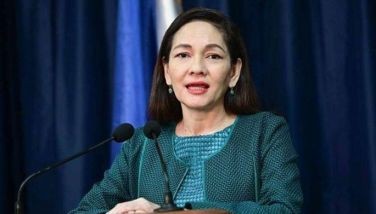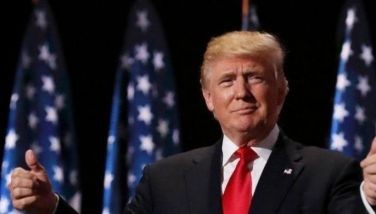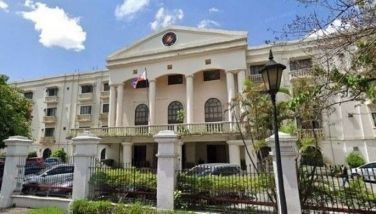$3-billion Japan investments committed
YOKOHAMA – President Aquino managed to secure investment commitments from three giant firms in a series of meetings here yesterday.
In a press statement, Malacañang announced an amount totaling $3.655 billion from Marubeni Corp., Itochu Corp. and Toshiba Corp., but later in the afternoon, Presidential Communications Development and Strategic Planning Office Secretary Ricky Carandang said the figure was not yet official.
The President met with Marubeni president and chief executive officer Truo Asada, Toshiba president and CEO Norio Sasaki, Itochu deputy COO Yoshihisa Nishimura and JGC president Masahiko Yaegashi. JGC is the design and technology arm of Itochu Corp.
In a press release, the President supposedly got the biggest investment commitment from Marubeni – at $3.4 billion – for the expansion of the Sual and Pagbilao power stations, Metro Rail Transit Line 7, Light Rail Transit 2 East and West extension project, and digital TV system and equipment.
Toshiba, on the other hand, will invest $133 million for its electronics products expansion in an economic zone.
Itochu eyes investment of $122 million for the development of 11,000 hectares of sugarcane plantation in Isabela for bio-ethanol production, which is expected to generate 18,000 jobs in two years and benefit some 15,000 farmers.
But Carandang said he could not yet confirm the figures and that the President would have to be the one to make the announcements.
“But we did meet with JGC, Itochu, Marubeni, we met with Toshiba, they already invested in the Philippines and they are very interested in additional investments in different sectors like power and other infrastructure deals. They were all invited to the PPP (Public-Private Partnership) conference and I think they will all be sending representatives. So there is a lot of interest in investing in infrastructure in the Philippines,” Carandang said.
Carandang also noted that it was Mr. Aquino who was getting a lot of questions during the APEC summit here.
“You saw that one of the questions from the audience was about infrastructure and the President took the opportunity to again plug the PPP conference. So there is a lot of interest right now in investing in the big ticket items that are going to be offered in the PPP conference,” Carandang told reporters.
As regards the Japanese investors, Carandang said, “I think it is pretty clear that they will be bringing in additional investments but a lot of details need to be discussed before we can make any announcements.”
“Hopefully by the time we get back to Manila the President would be able to give you details about the investments. But it is looking very good as far as attracting additional investments are concerned particularly from Japanese company,” he added.
In his appeal for the business executives’ participation in PPP, Mr. Aquino said greater private sector help in infrastructure development would free more funds for social projects.
“There’s been much interest in the infrastructure needs of the country, it is our hope that it will be a very successful program that leaves budget to attend to social concerns,” Mr. Aquino said.
“As the potential winners in a wider economic integration, private enterprise can help nudge the process forward by helping identify and manage the risks, while at the same time reminding policymakers of the benefits of integration,” Mr. Aquino said.
“Allow me to invite you to come and take a look and participate in what we are doing in the Philippines to improve the business environment and make it a more reliable and profitable investment destination. We are open for business and we look forward to a mutually beneficial relationship with you,” he stressed.
Currency support
The President also voiced the country’s support for a concerted action, particularly the adoption of an international framework for dealing with currency volatility as the US dollar continues to weaken vis-à-vis the peso.
“With regard to global financial securities, really our concentration has to do with volatility of the currencies and the emphasis on concerted actions,” he said.
“So we will work to ensure that that will continue and it will really be stronger so that there is less volatility in our lives,” Mr. Aquino said in a brief press conference in Tokyo.
Finance Secretary Cesar Purisima, who is part of Mr. Aquino’s delegation to the APEC summit, said a framework was important to curb volatility.
Foreign and trade ministers have called the currency volatility one of the most serious global challenges since the financial crisis in 2008.
“I think the framework is really a realization. Our country’s position is, we have to do this on a coordinated basis and therefore there is a need to establish a framework,” Purisima told reporters.
“A framework that recognizes the realities in the world right now that the developed economies are growing slower than the emerging markets and therefore there will be an accelerated flow of currencies to the emerging markets,” he said.
“And secondly, the bigger risk for the globe right now is that developing countries are going to deflation, and we don’t want that, all of us don’t want that. And therefore we must give them enough leeway to do whatever is necessary to do so. And third, that the emerging markets, I think will have to step up, in terms of not just focusing on exports but also developing their domestic markets,” he said.
Purisima said dollars flowing to the Philippines must be used in the Philippines to keep a balance between the peso and the dollar.
“Our plan is to channel the flow of dollars into PPPs that we have structured. And that’s why we’re launching that program next week,” he said.
“We believe that this is an opportunity for the Philippines to reduce the infrastructure gap, improve our productivity,” Purisima said.
“It’s a rare opportunity, we’ll take advantage of it. One of the things that’s very clear is that this is less of the strength of the peso but more of the weakness of the dollar,” he said.
“Trying to stop that is like stopping a wave in Manila Bay, you can’t do that. You can only smoothen it by creating intervention when necessary if its too volatile. But clearly, the direction to the emerging markets is strengthening of the emerging markets’ currencies because the growth prospect in emerging markets is going to be much better than in developed economies,” Purisima said.
Purisima said the government’s focus now was to lower the portion being borrowed from abroad.
“I think there’s opportunity to borrow from the local market, so we’ll continue to take advantage of that opportunity. One of the things that we’re trying to do is develop the longer end of the peso curb,” Purisima said.
Purisima said they were also sticking to the goal of reducing the foreign currency component when asked if the government would continue to issue more peso bonds.
APEC significance
Despite the emergence of other groupings like the Trans-Pacific Partnership (TPP) and the expansion of other regional organizations, Mr. Aquino said the APEC has not lost its significance.
The TPP negotiations commenced in March 2010 in Melbourne, with the participation of Australia, Brunei, Chile, New Zealand, Singapore, Peru, the United States and Vietnam. Malaysia joined the negotiations in October 2010 in the third round of negotiations.
The TPP intends to develop a high-quality, comprehensive 21st century free trade agreement.
“This (APEC) is a formula that has succeeded over the past decades and there doesn’t seem to be a necessity to change and we can probably continue with the plus plus plus plus formulas and get even more confident to deal with the rest of the global community,” the President said.
The President said the Philippines was committed to join other countries in reaching the goal of free trade but would also expect reciprocity, being a developing country.
“It’s the only forum that actually seeks out the private sector and it does generate a lot of ideas that should be heard by a lot of conservative politicians across the globe,” Mr. Aquino said when asked by a businessman as to how they could expect certainty in dealing with government when various fora like the APEC would not be able to produce binding agreements.
The President said the APEC could be a forum to change the status quo and that if it were to become a binding group, governments would likely be very hesitant in making commitments.
He said APEC could fulfill the role “of germinating and incubating ideas.” – Aurea Calica, Delon Porcalla
- Latest
- Trending





























